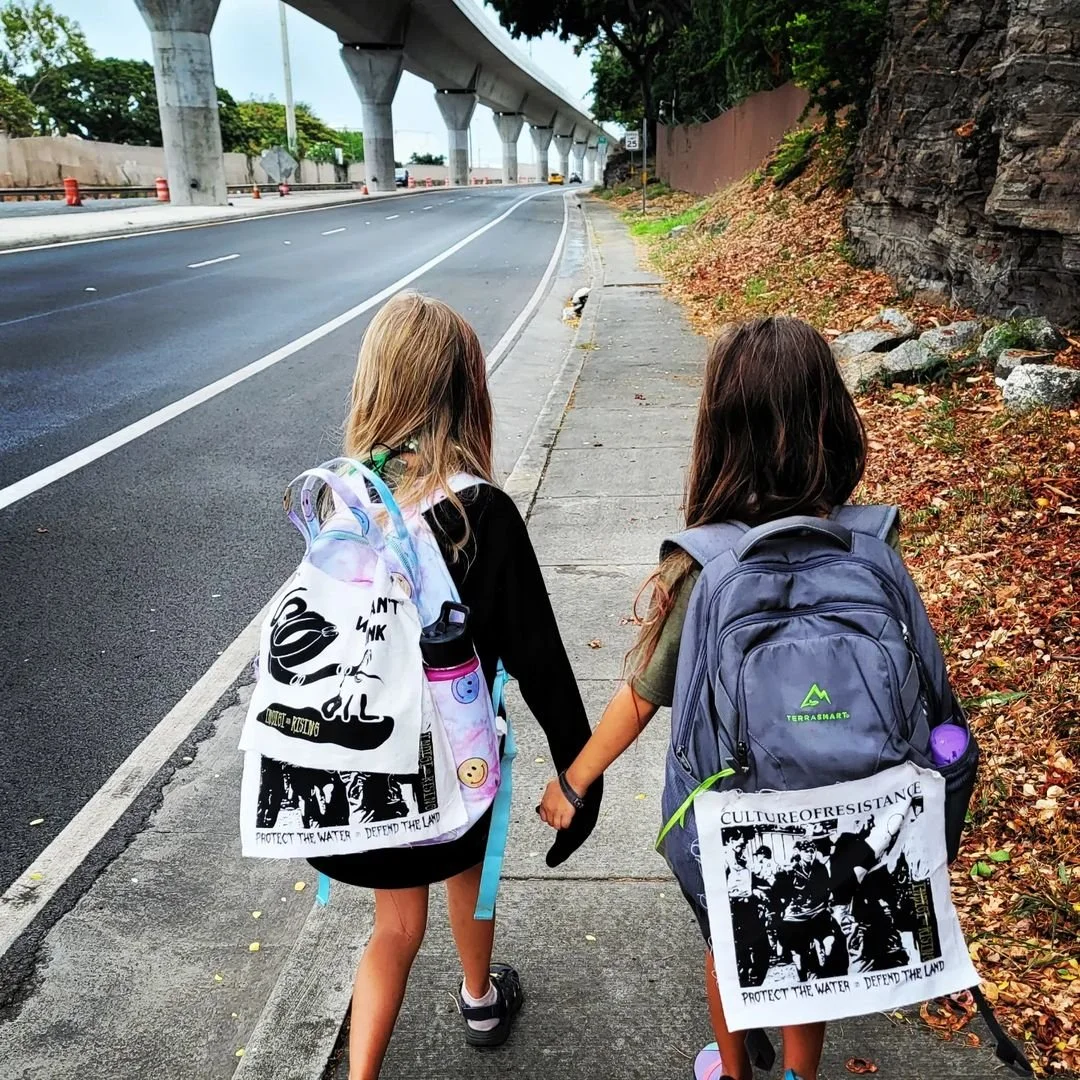SavetheMississippi.com is a project of the Rainbow Warrior Collective MN, a platform to raise awareness and mobilize action to safeguard the Mississippi River.
We are dedicated to protecting our waters for the next generation and empowering our youth to rise as guardians of Grandmother Earth, in an age-appropriate manner for the next seven generations. By providing education, empowerment, and community support, we aim to inspire community members, particularly youth and emerging leaders, to recognize the power they hold within themselves and collectively to invoke change. It is our duty to include and uplift them as they prepare to take the lead in safeguarding the Earth’s most vital resources. For this Earth is theirs to inherit.
The Rainbow Warrior Collective MN emerges from a deep-rooted commitment to honoring the sacredness of all life. We are an affiliation of individuals and family who have heeded the call to defend Grandmother Earth and all its inhabitants. Our knowledge and understanding stem from the teachings of various Elders, brothers, sisters, and kin from diverse tribes, traditions, and cultures, as well as from our own Indigenous roots and ancestors. Through shared experiences and a profound remembrance of ancestral wisdom, we strive to embody these teachings as a walking prayer in all that we do. The Rainbow Warrior Collective MN operates as a non-profit organization. We are not driven by profit, and no part of our earnings shall benefit any individual. All our resources are dedicated solely to fulfilling our mission.
Those that wish to make a donation can learn more at: WavesforWhales.com
Guided by this sacred responsibility, the Rainbow Warrior Collective MN is dedicated to:
Empower Indigenous communities to act as custodians of their own stories, practices, and customs, enabling them to preserve and share their rich cultural tapestry with the world in a pono way.
Foster environmental awareness and sustainable living practices that nurture a harmonious relationship with the natural world.
Protect and support all living beings and their habitats, with a particular emphasis on endangered species, through education, advocacy, and conservation efforts.
Advocate for the protection and preservation of waterways and water sources, recognizing and emphasizing their sacredness and importance to all life. Ola I ka Wai, Mni Wiconi, Water is Life.
Cultivate intercultural understanding, respect, and cooperation among all peoples.
Support individuals, tribes, organizations, and their initiatives dedicated to the preservation and transmission of ancestral wisdom and protecting the environment for the next seven generations.
Engage in legal advocacy and support litigation, when necessary, to combat environmental pollution, protect endangered species, and defend the rights of our communities.
Raise awareness about the exploitation and abuse of children and support initiatives that promote their protection and well-being.
To empower community members, particularly youth and emerging leaders, with the skills and knowledge necessary to initiate and implement projects that promote environmental sustainability, cultural preservation, and social justice.
Through mentorship, education, and hands-on experience, the nonprofit aims to cultivate a generation of "Soulutionary" individuals who:
"Recognizes all life as sacred, is committed to embracing any challenge as an opportunity to evolve, is dedicated to turning it into a blessing of Aloha, by taking self-responsible sustainable and compassionate action, rooted in peace, truth, love and freedom, in service of Mother Earth and all of creation, thereby supporting, uplifting and nurturing all life."
-Satya Christiane Douglas
The meaning of Aloha
Aloha, a word that resonates deeply with the Hawaiian people, holds a significance that extends far beyond a simple greeting. It embodies the very essence of the Hawaiian culture and way of life, encompassing love, affection, peace, compassion, and mercy. As Aunty Pilahi Paki so eloquently expressed, Aloha is not merely spoken, but rather, it is an experience that must be felt and lived.
At its core, Aloha represents a profound respect and love for one another, and a harmonious coexistence with the world around us. This philosophy is beautifully illustrated in the traditional Hawaiian greeting of sharing "ha," or breath. This intimate exchange, where foreheads and noses touch while inhaling simultaneously, signifies a deep connection and respect, recognizing the breath's vital role in health and its spiritual power or "mana."
Although the practice of exchanging "ha" is less common today, it remains a powerful symbol of Aloha's essence - an invitation to connect on a profound level, to share one's very being with another. This act of openness and vulnerability reflects the core values of Aloha, fostering a sense of unity and interconnectedness. The spirit of Aloha is also embodied in the ubiquitous "shaka" sign, a simple hand gesture that conveys friendship, understanding, and solidarity.
Aloha is a complex and multifaceted concept, encompassing not just love and compassion but also a deep reverence for all of creation. It is a way of being, a philosophy that guides interactions with others and the environment. Queen Liliʻuokalani's words beautifully capture this sentiment: "Aloha is to learn what is not said, to see what cannot be seen, and to know the unknowable."
Aloha can also be understood as an exchange of positive energy, where acts of kindness and compassion ripple outwards, creating a harmonious and interconnected world. It is the alignment of heart and mind, fostering peace and understanding. While deeply rooted in Hawaiian culture, the concept of Aloha resonates universally across Polynesia, where it is found in all Polynesian languages with the same fundamental meaning of love, compassion, and kindness. It is a testament to the shared values and interconnectedness of the Polynesian people.
It's crucial to approach the understanding of Aloha and other Hawaiian, Polynesian, Pacific Island, and all native or indigenous cultural concepts with humility and reverence. To understand the spirit of Aloha, seeking out the wisdom and guidance of Native Hawaiians, Kānaka 'Ōiwi (“native people” or literally “people of the ancestral bone”) or Kānaka Maoli (“real person” or “native Hawaiian”) or as part of the Lāhui (“Nation”) and other Pacific Islanders, through their teachings, authentic web courses, kumu (teachers), kūpuna (elders), indigenous-led organizations, or cultural centers, can provide invaluable insights into the deeper meanings and practices associated with these principles.
In essence, Aloha, like a ripple expanding outwards, is a profound and all-encompassing concept that lies at the heart of Hawaiian culture, resonates throughout Polynesia, and extends its embrace to the rest of the world. It is a way of life that celebrates love, respect, and harmony, reminding us of our interconnectedness with each other and the world around us. As Aunty Pilahi Paki wisely shared, Aloha is the true meaning and symbol of the Hawaiian culture and lifestyle. It is a gift to be cherished and shared, a reminder of the beauty and interconnectedness of all existence.
Aloha Spirit Law
Aunty Pilahi Paki (1910–1985)
Project Shaka
Check out these amazing resources by clicking them to learn more! Those who truly seek, will find...
Aunty Pilahi Paki (1910–1985) was a beloved native Hawaiian poet, philosopher, linguist, educator, spiritual guide, songwriter, author, and one of the holders of Hawaiʻi’s secrets. Over the years, she transmitted the sacred knowledge she was given about ALOHA to Hawaiians and non-Hawaiians alike.
Aunty Pilahi worked in the tourist industry among many others and wanted more knowledge about Hawaiʻi to share with the tourists she guided. A friend suggested she see a man that would help her. She was given an address and drove to his place unannounced. When she got out of the car, a man began chanting from the house, “Hele mai…!” When she got inside, he said, “I’ve been waiting for you.” She had no prior knowledge of who this man was.
She went into the house and spent some time with him. He told her, “All that I am and all that I have – do you want it?” She paused, looked him in the eye and said, “No.” She didn’t know what he was talking about. Then he blessed her by putting his hand on her head. She later said it was like “an electrical shock” – her whole body was vibrating. By this, he gave her his knowledge and mana. Everything that he knew he had passed on to Pilahi with the touch of his hand. And that was it.
Something happened to Pilahi that day and she knew it. In time, people came to Aunty Pilahi to learn but she always made it known that the transmission came down through her teacher and friend, David Kahekili Kia. She had no prejudice; she gave the same mana and knowledge to Hawaiians and non-Hawaiians alike. (Read more)
Water Protectors: We are the guardians of our sacred waters, rivers, and lands, upholding the interconnectedness of all life.
Ola I Ka Wai, Mni Wiconi, Water is Life: Water is the lifeblood of our planet, the source of all existence, and must be honored and defended.
“…the water is the life's blood of our mother the earth. Water is the life's blood of our own bodies” — Grandma Nancy
Some of Our Guiding Principles:
Honoring the Sacred: We pay homage to our Creator, the seven sacred directions, the sacred elements, our ancestors, and elders whose wisdom guides us.
Gratitude and Sharing: We walk a path of gratitude, sharing the gifts bestowed upon us by all our relations, both seen and unseen.
Balance and Right Relations: We strive to walk a pono path, one of balance and right relations with all beings and the Earth.
Protecting the Sacred: We stand in solidarity with environmentalists and activists risking all to protect our waters, lands, and children.
Ua Mau ke Ea o ka ʻĀina i ka Pono - The life and sovereignty of the land is perpetuated through righteousness. (about Kauikeaouli)
Women as Water Carriers and Protectors: A Legacy of Stewardship
Traditionally, women have held the sacred role of water carriers and protectors in many cultures. They have been the keepers of wells, springs, and rivers, ensuring the purity and availability of water for their communities. Their intimate connection to water, both physically and spiritually, has made them natural guardians of this precious resource.
Today, women continue to lead the fight for clean water and environmental justice. From the frontlines of Standing Rock to the streets of Flint, they are powerful voices for change, advocating for the health of our planet and future generations. Their courage, resilience, and deep love for water inspire us all to protect this sacred gift.
We honor the legacy of women as water carriers and protectors, recognizing their vital role in preserving the lifeblood of our planet.



















